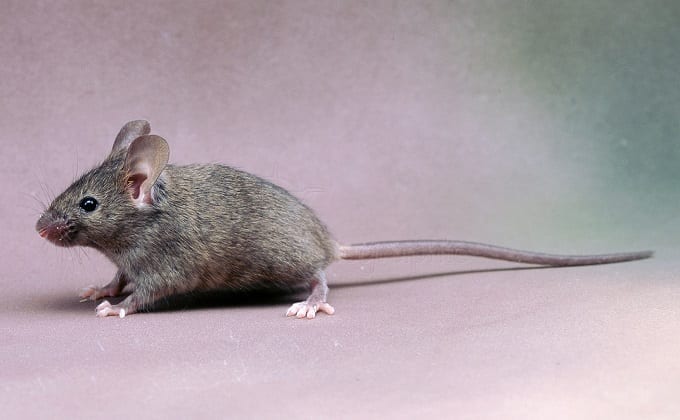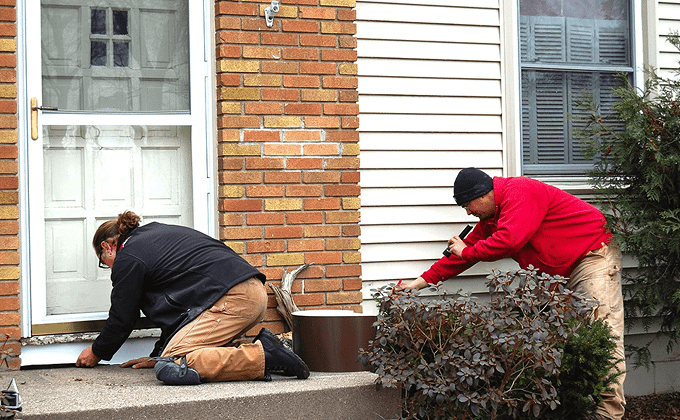One of the most troubling pests to find in your home would have to be the common house mouse.
These small, fluffy creatures might seem harmless enough when you spot just one, but a sighting of a single rodent is usually the sign of something far worse because of just how fast they can multiply.
How fast do mice multiply then?
One single mouse can make up to 60 offspring in a single year which is spread out over up to 10 litters, so consider how many mice could be born in your house when that one single mouse multiplies to many more. Because a mouse can immediately mate after giving birth, they are on a non-stop cycle of breeding and producing litters year-round which means your home can become overrun quickly.
This fast rate of reproduction is what makes mice one of the hardest pests to treat and the fact that it can be hard to tell when they’ve taken over your home makes it even worse.
We’re going to look at the rate of reproduction for these pests to figure out how fast do mice multiply and what you can do to stop it.
Contents
How Long Does it Take For Mouse to Multiply?
To get an understanding of just how quickly mice can multiply in your home, we need to first get the basics about the life cycle of these rodents.
The ease in which they get pregnant and give birth is what makes them such a formidable opponent when it comes to pest control, so even though their lifespan might be shorter than you think they can easily multiply in no time at all.
A single female mouse is capable of making up to 60 offspring in a year, and sometimes a lot more.
When they get pregnant, the entire cycle takes up to 21 days only for them to give birth which produces up to 12 pups per pregnancy.
Once they have given birth, they’re able to get pregnant again immediately so every 25 days or so she could be producing a whole new litter of mice into your home.
Although they don’t live that long, the pups that they give birth to are able to start breeding when they become sexually mature at just six weeks old.
With 12 pups in each cycle now all having their own babies, your home can be taken over in a matter of months.
Looking at this cycle and how easily it is for them to reproduce it’s clear why a mouse infestation is something that should be taken seriously when you notice the first signs at your home.
What Size is the Typical House Mouse Population?

Most people don’t even realize that their home is being shared by an infestation or colony of mice until they physically see one for themselves.
Seeing just one mouse usually means that there are many more around, and rarely is it a single rodent.
Because they’re so adept at hiding people don’t realize how many they actually have until it’s pointed out by a professional pest service.
The average house with a mice problem can have up to 300 of the rodents after just six months from the initial pregnant mouse getting in.
Although this number seems dramatic and it won’t always apply to every home, it does give you an idea of what you can expect if you don’t take care of the problem at the start.
There are different terms used to describe the number of house mice that might be living at your home.
A colony or infestation are both popular measures used by pest experts but the exact number of mice that this refers to is never the same.
You can be assured though that the sighting of just one mouse indicates more and even if you haven’t seen one yet, they are one of the most common pests that households deal within the US.
Rather than avoiding the common signs of a mouse infestation or simply assuming that they’re not in your home, prevention is the key to success.
Being vigilant and ready for a mouse to enter your home and laying some carefully placed traps around the home is the basic level of pest control that all homes should be doing, even if you don’t suspect that you have them.
Common Signs of Mouse Infestation
The best way to keep mice away and prevent them from multiplying and getting out of control at home is to know what to look for that might indicate their presence.
Being able to spot the signs early can stop this reproduction process in its tracks and prevent it from getting out of control, but you’ll need to look in dark and closed-off spaces with a flashlight to get the best idea of what’s going on.
Be on the lookout for any of these signs of rodent infestation:
Strange odor
A house with a mouse problem will usually be easy to spot just by using your nose.
This is due to the urine left behind by mice which, as it ages, starts to develop a musky odor. The more mice you have the stronger this will be, even when you’re not searching for it.
Rat droppings
Knowing how to identify rat droppings can be helpful in determining whether you have this pest.
A rat dropping is no bigger than a quarter of an inch in size and is pointed at both ends. A new dropping will be dark and shiny compared to an old one which looks dried out and crumbly.
Larger droppings might indicate a rat issue but anything under a quarter of an inch usually belongs to mice.
Gnawed holes and marks
Mice love gnawing on things like drywall and wood, and their gnaw holes usually measure the size of a dime.
Other marks they leave behind include when they rub against walls and other walkways they’ve made and leave a shiny mark or small scratches that indicate mice have been there.
Pathways
When you have a lot of mice in your house, they will start to develop pathways or runways that they all take to travel around the area.
These pathways can be easily spotted in hidden areas like along wires, interior walls, and ledges, or outside on fences and tree branches.
Nests
Mice love to build nests indoors and they will do so in your house using a random assortment of materials like shredded paper and string.
Spotting one of these is a definite sign that you have multiple mice living in your house and likely other nests as well.
Unexplained noise
Most people are alerted to a rodent issue because they hear them before they see them.
You will usually hear mice moving around at night when they feel safer and it can sound like scratching or scurrying occurring behind your walls.
Unusual behavior from pets
Dogs and cats can be some of the most reliable sources when it comes to picking up a mice problem at home.
If you notice your pet acting strange, following things that you can’t see, or barking and scratching at certain areas of the house like behind walls or furniture, this is usually a sign that they’ve spotted or can sense a mouse or other rodent.
How to Keep Mice Away From Your House

The key to treating and eliminating any type of pest, whether it’s a mouse or an ant, is all about prevention.
You can have a mice infestation treated or set up traps to catch them but if you don’t get to the source of why they want to retreat to your house, you’ll never totally get rid of them.
The first and most important step is figuring out their entry point into the house and sealing it.
You’ll need to get on your hands and knees to look for cracks and holes that might let them in and then seal them up with things like caulk and steel wool.
A standard house mouse can fit through a dime-size hole so it may be less obvious than you think.
Secondly, you’ll want to remove anything inside that attracts them and get your house in order.
Consider the food that’s left out or not in airtight containers, birdseed and nuts, unclean areas, clutter, and things that are usually attractive to pests.
Layout a few standard mouse traps and bait them with peanut butter, which is one of their favorite foods, and sees if you come up with anything.
How to Treat a Mice Infestation at Home

Once you’ve established that there are mice in your home and you want to put an end to their multiplication, you have a few ways you can treat the issue.
In addition to using the preventative methods, consider these options for getting rid of mice:
- Snap mouse traps: The traditional style of a snap mouse trap is still highly effective and can indicate whether you have a bigger problem to worry about.
- Electric mouse traps: These use an electric current to shock a mouse as it’s trapped so that it’s killed instantly.
- Humane mouse traps: A trap that lets you catch a mouse without killing it so that it can be released back outside humanely.
- Pest repellents: Natural pest repellents like electromagnetic devices can keep mice away without harming your family.
- Professional pest control: For serious problems and infestations you can call in a pest control expert to eradicate the mice.
Related Questions
Dealing with a mouse infestation is never pleasant but is something that occurs regularly due to their high reproduction rate.
These are some frequently asked questions homeowners have about the common house mouse to give you more insight into the pest.
Do Mice Hate the Cold?
Winter is one of the most common times for a mouse infestation to occur at home because the rodents are looking for somewhere warm to live during the colder months.
You should be especially vigilant about sealing up entry points when the temperature drops to avoid them coming inside.
What Do Mice Like to Eat?
Mice prefer to eat foods like seeds, nuts, fruits, and grains, which most households have plenty of in their pantries.
As omnivorous animals, they will usually be open to eating anything that is left out and if hungry they have been known to eat insects and other mice.

